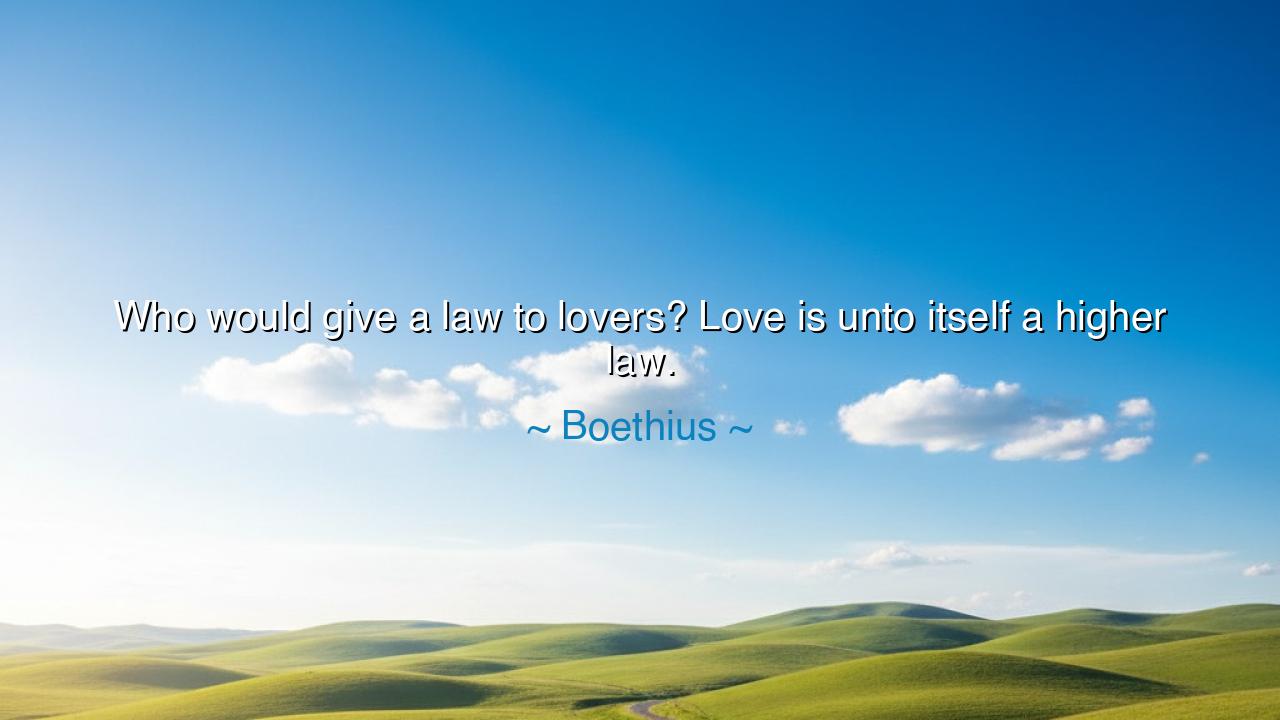
Who would give a law to lovers? Love is unto itself a higher law.






Boethius, a philosopher whose heart beat for the truths of the soul, once declared, “Who would give a law to lovers? Love is unto itself a higher law.” In this profound assertion, Boethius points to a truth as ancient as time itself—that love, in its purest form, cannot be bound by any external rule or law. It exists not in the realm of lawmakers or judges, but in a domain beyond the reach of man’s judgments. Love is its own law—self-sustaining, sovereign, and absolute. To love is to be bound by a truth greater than any decree or command. No earthly power can define, restrain, or dictate the course of love, for love is free, eternal, and always its own master.
In the ancient world, the greatest philosophers often pondered the nature of love. The philosopher Plato, in his "Symposium," spoke of love as a force that transcends the mortal realm, one that pulls the soul toward the divine. Aristotle too, though he spoke of virtue and ethics, understood that love could not be confined to the rigid boundaries of law. It was a higher calling, one that moved beyond the laws of society and into the depths of the human soul. Love, as Boethius teaches us, is a power that operates on a different plane—one where reason, order, and structure are mere shadows compared to the overwhelming force of love’s embrace. It is the law of the heart, not of the state.
Consider, O children of the earth, the story of Antigone in Greek myth. In her loyalty to her brother, Antigone defied the law of the king, her uncle, because her love for family and her devotion to what she saw as the higher law of honor and duty were stronger than the laws of the land. In this tragic tale, we see a soul driven by love—a love so powerful, so unyielding, that it defies the decrees of kings and gods. The law of the king could not contain her love; it was as if the very force of the universe itself was urging her to act beyond the rules, for her love was a law higher than any decree that could be written in stone.
In the realm of the flesh, love may be seen as an emotion, a fleeting feeling of affection. But in the deepest truth, love is a force, a law that compels, directs, and even transcends the confines of our existence. When a person loves deeply, they do not ask permission, nor do they seek approval. True love does not need laws to define it; it operates according to a higher, divine order—one that seeks the good, the truth, and the beauty of the soul. Love is the law that governs the heart, and when it speaks, the soul follows without question.
Consider, too, the enduring love between Abelard and Heloise, whose passion defied both society’s expectations and the constraints of religious law. Their love was not bound by the rules of the church or by the dictates of their time. Though their love ended in tragedy, their hearts never bowed to the law that sought to divide them. Their love was a higher law, one that led them down paths of sacrifice, devotion, and ultimately spiritual transformation. They gave up worldly rewards for a love that could not be contained by earthly powers, and their story continues to inspire all who recognize the power of love's law.
O children, take heed of this lesson, for the law of love is one that cannot be broken. No human law can contain the forces of the heart when love is true. Love is not bound by the rules of society, nor does it seek approval from those who hold earthly power. Love speaks to the soul in ways that transcend language, and it calls us to act with integrity, honor, and devotion, regardless of what the world may say.
So, let love be the guiding law of your heart. In all things, love must come first, for it is the highest law of all. When you love, do not seek the permission of the world or the approval of others. Follow the path of the heart, and know that in doing so, you are following a truth older and more powerful than any rule written by man. Allow love to guide your actions, for when you live by love’s law, you will find your soul at peace, and your life will become a testament to the highest and most noble force the universe has to offer.






AAdministratorAdministrator
Welcome, honored guests. Please leave a comment, we will respond soon